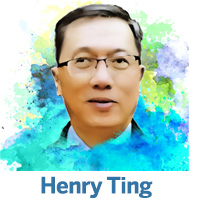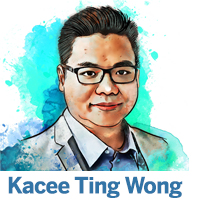According to Paul O’Connor, who is an adjunct assistant professor at Lingnan University, Muslims in Hong Kong feel their religion is accorded respect, and the city “delivers some very valuable and unique freedoms”. (Paul O’Connor, Islam in Hong Kong: Muslims and Everyday Life in China’s Worlds City (HKU Press, 2012)).
 To a large extent, O’Connor’s observation has stood the test of time. It is worth noting that Hong Kong is not negatively affected by Islamophobia. Fortunately, Muslims in Hong Kong do not feel the stiff outer breezes of the threatening Islamophobic typhoon, which has triggered a proliferation of negative narratives against Islam in the mass media of the United States, the United Kingdom and France in the past two decades.
To a large extent, O’Connor’s observation has stood the test of time. It is worth noting that Hong Kong is not negatively affected by Islamophobia. Fortunately, Muslims in Hong Kong do not feel the stiff outer breezes of the threatening Islamophobic typhoon, which has triggered a proliferation of negative narratives against Islam in the mass media of the United States, the United Kingdom and France in the past two decades.
However, language barriers, inadequate social interaction, and the maintenance of involuntary social distance between the permanent Muslim residents and mainstream communities remain the factors that could compromise the prospect of the former successfully integrating into the mainstream economy.
 In order to foster deeper integration between permanent Muslim residents and mainstream communities, our think tank would like to act as a bridge between these two communities. Special consideration is given to the life planning needs of the permanent Muslim residents in the city. Generally speaking, the stock of human capital available in Muslim households is far from adequate, with many parents being unable to help their children explore a proper life direction, partly because of their limited knowledge in life planning, and partly because of their limited exposure to the working environment in Hong Kong. Unable to seek quality advice from their parents in life planning, teenagers from Muslim families often have difficulty in making proper educational and career choices that are compatible with their character, interests, aspirations, and abilities. Making proper educational and career choices can enhance their eudaimonic well-being.
In order to foster deeper integration between permanent Muslim residents and mainstream communities, our think tank would like to act as a bridge between these two communities. Special consideration is given to the life planning needs of the permanent Muslim residents in the city. Generally speaking, the stock of human capital available in Muslim households is far from adequate, with many parents being unable to help their children explore a proper life direction, partly because of their limited knowledge in life planning, and partly because of their limited exposure to the working environment in Hong Kong. Unable to seek quality advice from their parents in life planning, teenagers from Muslim families often have difficulty in making proper educational and career choices that are compatible with their character, interests, aspirations, and abilities. Making proper educational and career choices can enhance their eudaimonic well-being.
After planning the bridging work, our think tank furthered the plan by forming a partnership with Islamic Kasim Tuet Memorial College (IKT College) in late 2023. Under the supervision of our executive committee, volunteers of the Rainbow Graduation Team are responsible for giving advice to Form 5 and Form 6 students on education and career planning in our partner schools, including IKT College. The Rainbow Graduation Team will be responsible for organizing education and career talks and small-group interactive sessions between senior form students and different professionals from our think tank. A legal talk was organized for IKT College’s students in December 2023.
The Rainbow Pair-mentorship Program, which is responsible for helping teenagers living in subdivided units, is also run by our think tank. Volunteers of the Rainbow Pair-mentorship Program and Rainbow Graduation Program are invited to attend one of our training courses. In order to ensure that both Rainbow Programs stand a greater chance of success, we provide high-quality training materials for the volunteers. The courses consist of six sessions; namely, communication skills, Martin Seligman’s theory of positive psychology and the three P’s (personalization, pervasiveness, and permanence), empathy and mentorship-connecting skills, the emotional quotient, education and career planning (e.g., Holland Code and DISC analysis), and financial planning for teenagers.
The willingness of some of our directors to run the 20-hour training courses has injected a much-needed dose of optimism into the Rainbow Programs. Lau kin-shing, who is a psychologist in the city, is one of the tutors for these programs. Volunteers, who are catering for the life planning needs of IKT College’s students, are required to take an additional four-hour course in Islamic culture. Most of our volunteers are either graduates or undergraduates of universities in the city. Their most important attribute is the commitment to helping Muslim students find proper educational and career choices.
The youth is the hope of the city. To support our young people, the Home and Youth Affairs Bureau has published a youth development blueprint that comprehensively lists the challenges faced by local youths and explores possible ways to overcome these challenges. Muslim youths face many of the same challenges as other Hong Kong youths, but their challenges are aggravated by some unfavorable factors. Apart from their economic disadvantages, Muslim youths face great difficulty in learning the Chinese language and mingling with youths of Chinese ethnicity.
It hardly needs emphasizing that Chinese-language proficiency is a genuine occupational requirement for most job seekers in the city. Even employers who are sincere about helping Muslim youths are hard-pressed to navigate around the language requirement. In an age of artificial intelligence, simple simultaneous translation is becoming easier. Nevertheless, translating complex sentences and idiomatic expressions by machine is difficult. Communication is not only about simple exchange of information, but it also involves human interaction. Few of us relish talking to an emotionally detached translation machine.
Muslim youths should be seen as valuable human capital that can promote the well-being of the whole city and not just their own communities. With proper life planning, we hope we will be able to develop Muslim youths for the future, though we cannot build the future for them. In addition to running programs to foster a stronger sense of belonging among these young people, we will organize tours for them to help them gain a better understanding of the remarkable achievements of the Chinese mainland in the past few decades, and the dream of the Chinese people’s national rejuvenation. We also hope that the tours will provide a valuable chance for these young people to brush up on their Chinese-language skills.
Henry Ting is chairman of the International Chinese Welfare Foundation, and vice-chairman of Chinese Dream Think Tank.
Kacee Ting Wong is a barrister, part-time researcher of Shenzhen University Hong Kong and Macao Basic Law Research Center, chairman of Chinese Dream Think Tank, and a district councilor.
The views do not necessarily reflect those of China Daily.


